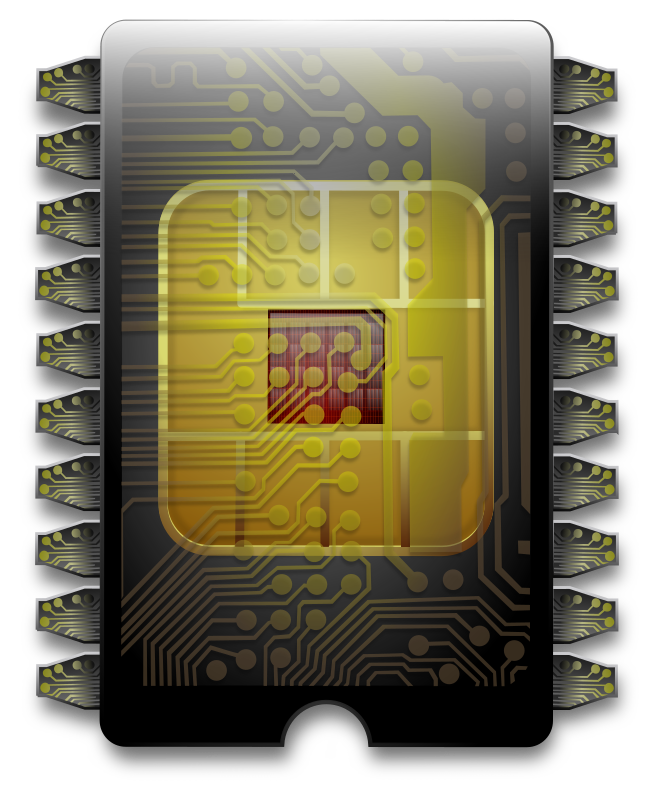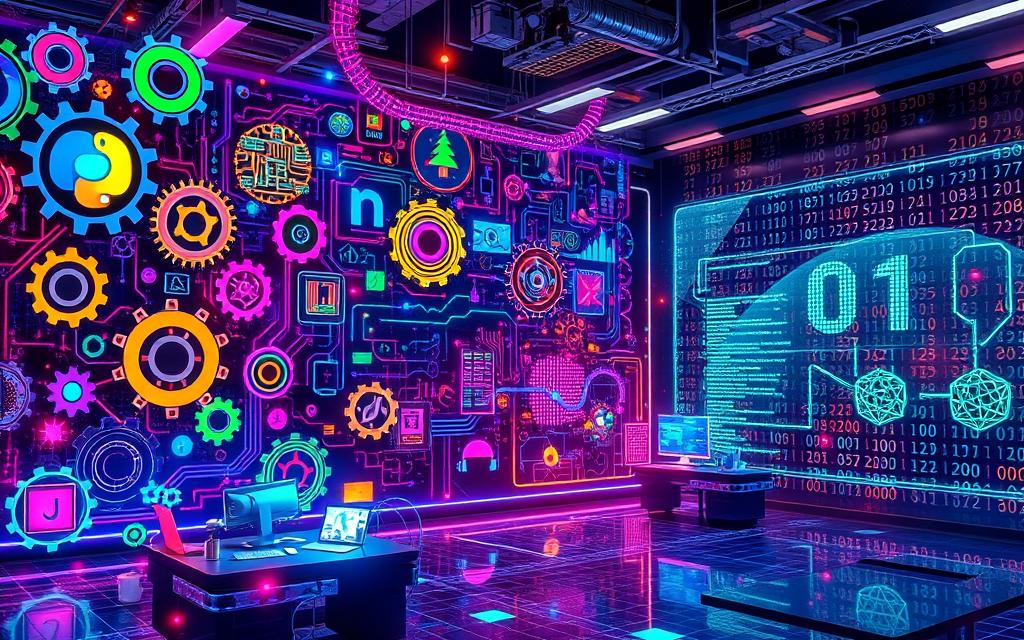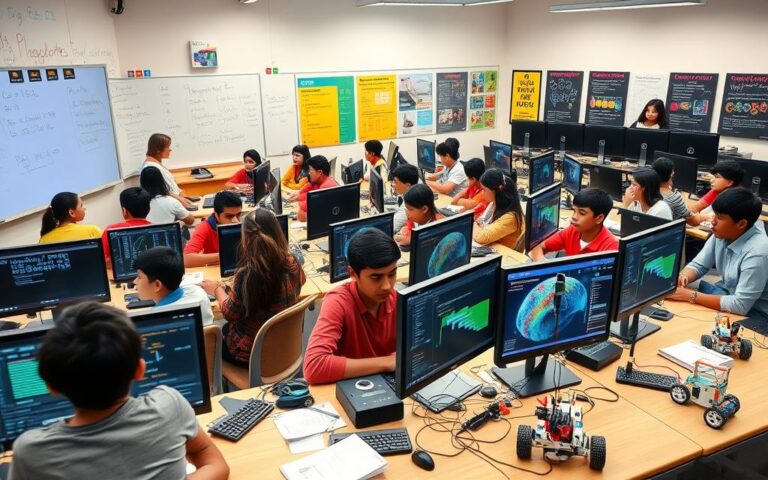What Do You Need to Succeed in Computer Science?
To do well in computer science, you need technical skills, soft skills, and knowledge. This includes programming languages, data structures, and algorithms. You also need to know about software engineering. A strong math background and logical thinking are key too.
Staying updated with new tech is also important. This keeps your skills sharp and relevant.
Computer science education lays a solid base for a career in this field. It’s vital to understand programming languages, data analysis, and software development. These are all key parts of computer science education.
The Bureau of Labor Statistics says computer jobs will grow by 15% from 2021 to 2031. Salaries range from $57,910 for support specialists to $134,875 for cloud engineers. So, getting computer science skills through education is very important.
Getting computer science skills opens many career doors. You could become a database architect or a cloud engineer. It gives you the knowledge and skills to thrive in this fast-changing field. That’s why computer science education is so vital.
Essential Technical Skills for Computer Science Success
To do well in computer science, you need certain technical skills. These include programming languages and problem-solving abilities. These are key for making, testing, and improving software, and for solving tough problems.
Important technical skills for computer science include mathematics and logical thinking. These help in creating algorithms and models. Knowing at least one programming language, like Java, Python, or C++, is also vital. Plus, having strong problem-solving skills is important. These skills help you figure out problems, find solutions, and put them into action.
- Programming language basics, like data structures and algorithms
- Mathematics and logical thinking, including statistics and calculus
- Problem-solving skills, including analysis and implementation
With these key technical skills, computer science pros can work on software design, development, and testing. They can also tackle and solve complex problems. This needs a solid base in programming languages, mathematics, and problem-solving. These are critical for success in computer science.
The Foundational Knowledge What Is Needed for Computer Science
To do well in computer science, you need to know the basics. This includes computer systems, software engineering, and data structures. You also need to understand algorithms, database systems, computer networks, and operating systems. This knowledge is the starting point for more learning and specialising in computer science.
Having a strong base in computer science is key for a good career. With over 70% of computing jobs outside IT, there’s a big need for skilled people. The U.S. Bureau of Labor Statistics says computer programmers earn an average of $107,750 a year. The top 10% make up to $167,230.
Some important areas in computer science are:
- Algorithms and data structures
- Computer systems and architecture
- Software engineering and design patterns
- Database systems and management
- Computer networks and cybersecurity
Learning these areas well helps build a strong computer science foundation. It opens doors to careers like software development, data science, and computer systems analysis. With the right skills, computer science experts can make a big impact in tech and innovation.
| Career Path | Mean Annual Wage | Mean Entry-Level Salary |
|---|---|---|
| Computer Programmers | $107,750 | $64,048 |
| Computer Hardware Engineers | $147,770 | $76,707 |
| Computer and Information Systems Managers | $180,720 | $65,570 |
Building Your Programming Portfolio
A strong programming portfolio is key for any computer science hopeful. It shows off your skills and knowledge. It proves you can use theory in real-world problems. To build a portfolio, create personal projects that show your skills in different programming languages and technologies.
When making your portfolio, pick a variety of projects. These can be web development, mobile apps, or data analysis. Working on open-source projects is also great. Always update your portfolio to show your growth and dedication to learning.
Here are some tips for your programming portfolio:
- Include 4-10 projects to show your skills and problem-solving
- Update your portfolio often to show your coding passion and work ethic
- Focus on both technical skills and soft skills like creativity and communication

By following these tips and making a strong portfolio, you can stand out in a tough job market. You’ll catch the eye of employers.
| Project Type | Description |
|---|---|
| Web Development | Building a website using HTML, CSS, and JavaScript |
| Mobile App Development | Creating a mobile app using Java or Swift |
| Data Analysis | Analyzing and visualizing data using Python and data visualization libraries |
Critical Soft Skills for Computing Professionals
Being a computing professional means you need the right soft skills to succeed. A report by ZDNet shows that skills like communication, teamwork, and time management are key. These skills help you work well with others and explain complex tech ideas simply.
- Effective communication skills to share technical ideas clearly and briefly
- Teamwork and collaboration to reach shared goals
- Time management and prioritization to hit deadlines
Improving these soft skills takes practice, mentorship, and learning. By working on these areas, computing pros can do better and reach their career goals.
In today’s quick tech world, having both tech and soft skills is key to staying on top. By focusing on these important skills, computing pros can succeed and meet their career targets.
| Skill | Importance |
|---|---|
| Communication | High |
| Teamwork | High |
| Time Management | Medium |
Educational Requirements and Academic Preparation
Getting a good education in computer science is key for a career in this field. It starts with strong maths and science at school. Students should work on solving problems, thinking logically, and analysing data.
At university, students need to study computer science, software engineering, and more. Getting certifications like CompTIA A+ or Cisco CCNA can help too. The IEEE and ACM have set out what graduates should know, including algorithms and programming languages.
Secondary School Prerequisites
Students at secondary school should take maths, science, and computer science. These subjects are essential for a career in computer science. They include:
- Mathematics: algebra, geometry, calculus
- Science: physics, chemistry, biology
- Computer science: programming languages, data structures, algorithms
University Course Selection
At university, students should pick courses that match their career goals. Important courses include:
- Computer science: software engineering, computer systems, networking
- Mathematics: discrete mathematics, linear algebra, differential equations
- Electives: data science, artificial intelligence, cybersecurity

Professional Certifications
Professional certifications can boost your career in computer science. Some top certifications are:
| Certification | Description |
|---|---|
| CompTIA A+ | Entry-level certification for IT professionals |
| Cisco CCNA | Certification for networking professionals |
| Linux Essentials | Certification for Linux professionals |
By focusing on education and getting certifications, students can succeed in computer science. This increases their chances of being hired by top companies.
Tools and Resources for Learning Computer Science
Learning computer science needs the right tools and resources. Luckily, many learning resources are out there. These include development environments, online platforms, and technical guides. They offer everything needed for coding, debugging, and testing.
Popular online platforms for learning computer science are Coursera, Udemy, and edX. They have a wide range of courses, from basic programming to advanced topics like AI and machine learning. Sites like hubcomputers.co.uk also list top online courses for A-level computer science.

Students also need tools like Eclipse or Visual Studio for development environments. They should also use technical guides and collaboration tools like GitHub or Stack Overflow. These help build a solid computer science foundation and keep up with new tech.
Key Resources for Computer Science Students
- Development environments: Eclipse, Visual Studio
- Online platforms: Coursera, Udemy, edX
- Technical documentation: API documentation, user manuals
- Collaboration tools: GitHub, Stack Overflow
By using these learning resources and online platforms, students can really understand computer science. They’ll also develop the skills needed to do well in the field.
Developing a Growth Mindset in Technology
Having a growth mindset is key to success in technology. Neuroscientists say our brains grow like muscles. Learning gets better when we think we can improve.
Carol Dweck’s work shows that praising effort, not just talent, leads to better learning. This approach helps us grow and learn more.
A growth mindset means facing challenges, not giving up, and learning from mistakes. In technology, where things change fast, this mindset is vital. It helps us keep up and make a real impact in our work.
Here are some ways to grow your mindset in technology:
- Take on challenges and look for ways to grow
- Focus on the journey, not just the end result, and learn from feedback
- Stay curious and see failure as a chance to learn
Using these strategies can help you grow personally and professionally. It’s important for advancing in the tech field and making a difference in your career. As technology keeps changing, a growth mindset is essential for success.
Career Pathways in Computer Science
Computer science has many career pathways to explore, like software development, data science, and cybersecurity. The need for skilled tech professionals is growing fast. This makes it a great time to start a career in computer science.
Fields like artificial intelligence, machine learning, and human-computer interaction are in high demand. These areas are always changing. Experts in these fields are highly sought after. The career guide by Syracuse University says software developers earn an average of $102,432 a year.
Here are some average salary ranges for different computer science careers:
- Software Developers: $105,000
- Web Developers: $69,000
- UX Designers: $74,000
- IT Project Managers: $142,000
With computer and information technology jobs growing faster than many others, it’s a great time to look into computer science careers. There are many career pathways and industry specialisations to explore.
| Career Pathway | Average Salary | Projected Growth |
|---|---|---|
| Software Developers | $105,000 | 21% |
| Information Security Analysts | $112,976 | 33% |
| Computer Scientists | $130,725 | 26% |
Conclusion: Your Journey to Computer Science Excellence
Starting your journey in computer science is exciting. It’s not about beating others, but growing and finding joy. Face challenges head-on, as they lead to your success. Keep learning and growing, and you’ll see the amazing rewards of this field.
Use your skills and experience to solve real problems. This will make you a better problem solver and thinker. Join internships, open-source projects, and the computer science community. These steps will make you stand out and boost your job chances.
Your university education is just the beginning. Keep learning, be open to change, and follow your interests. With hard work and determination, you’ll master computer science. Start your journey, and you’ll open doors to a bright future.
FAQ
What skills are needed to succeed in computer science?
To do well in computer science, you need technical and soft skills. You should know programming languages, data structures, and algorithms. Also, software engineering, mathematics, and logical thinking are key.
What is the foundational knowledge required for computer science?
You need to understand computer systems and software engineering. Data structures, algorithms, and database systems are also important. Plus, computer networks and operating systems are foundational.
How can I build a programming portfolio?
A programming portfolio is vital for computer science careers. Start with personal projects like websites, apps, or games. Open source projects are great for experience and portfolio growth. Remember to document your code well.
What soft skills are critical for computing professionals?
Computing pros need good communication, teamwork, and time management. You must explain technical ideas clearly. Working well with others and managing time are also key.
What are the educational requirements for computer science?
For computer science, a maths and science background is essential. At university, take computer science and software engineering courses. Professional certifications can also help your career.
What tools and resources are available for learning computer science?
Many tools and resources help learn computer science. Development environments and online platforms are great for coding. Technical documentation is also useful for understanding software systems.
Why is developing a growth mindset important for success in technology?
A growth mindset is vital for tech success. Be open to learning and adapting. Embrace challenges and learn from failures. Being receptive to feedback and new ideas is also important.
What are the career pathways available in computer science?
Computer science offers many career paths. You can specialise in software engineering, data science, or cybersecurity. Jobs are plentiful, with good salaries ranging from £60,000 to over £100,000.















